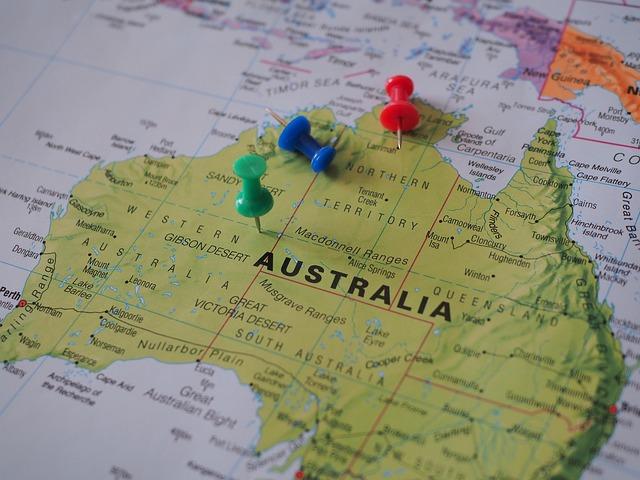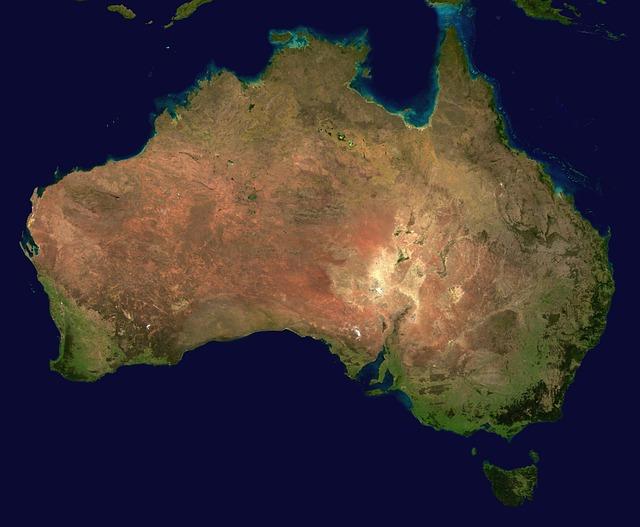In a significant geopolitical maneuver, Australia has reportedly restricted China’s access to key ports in Papua New Guinea (PNG), a move that underscores the escalating military tensions in the region. This decision comes amidst growing concerns over China’s expanding influence in the Pacific, and it reflects Australia’s commitment to safeguarding its national security interests and bolstering strategic partnerships with its neighboring countries. As Australia navigates the complexities of regional dynamics, this latest progress not onyl highlights the intensifying competition for influence between major powers but also raises critical questions about the future of the Pacific geopolitics. In this article,we will delve into the implications of Australia’s actions,the context of Chinese interests in PNG,and the broader ramifications for regional stability and international relations.
Australias Strategic Shift in Port management Amid Rising Military Tensions
Australia’s strategic pivot in port management comes as part of a robust response to escalating military tensions in the Asia-Pacific region. This shift is marked by a decisive move to exclude Chinese interests from key port operations in Papua New Guinea (PNG), a nation with critical maritime proximity and strategic importance. Such actions aim to solidify partnerships with traditional allies, enhancing regional security frameworks while countering China’s influence in its immediate vicinity. Australia’s commitment to ensuring that its neighboring regions remain free from hostile undertakings is clearly articulated through this policy shift.
Key components driving this strategy include:
Strengthened Alliances: Deepening ties with Western allies, including the United States and Japan, to ensure cooperative naval and logistical operations.
Investment in Infrastructure: Enhancing local capacity and resilience by investing in PNG’s port facilities to facilitate non-Chinese partnership engagement.
Intelligence Sharing: Elevating the level of intelligence and security operations to monitor activities at critical maritime chokepoints.
Feature
Implication
Port Exclusivity
Restricts foreign military access
Increased Naval patrols
Enhances regional security visibility
Bilateral Agreements
Fosters collaborative governance

Implications of Locking Out China: Geopolitical and Economic Consequences
The recent decision by Australia to restrict Chinese access to ports in Papua New Guinea represents a significant shift in the geopolitical landscape of the Asia-Pacific region. As military tensions escalate, this action could prompt a ripple effect across international relations, exacerbating existing conflicts and potentially igniting new ones. Analysts warn that such moves may lead to a realignment of alliances, with countries forced to choose sides as the U.S. and its allies distance themselves from China.
In terms of economic consequences, the implications are equally profound. By locking out a major economic player like China, Australia risks disrupting trade dynamics not only in the Pacific but globally. Potential outcomes could include:
Trade Diversification: Countries may seek alternative trading partners,altering established supply chains.
Increased Costs: Restrictions could lead to higher shipping and commodity prices, impacting consumers.
Investment Shifts: Chinese companies may redirect investments to more favorable environments, reducing Australia’s economic growth potential.
Potential Outcomes
Description
Global Trade Shifts
Reorientation of trade routes and partnerships.
Economic Isolation
Marginalization of Australia in the Asian trade context.
Heightened Competition
Increased regional competition for resources and influence.

Strengthening Regional Alliances: The Role of Australia in Pacific Security
The ongoing military tensions in the Pacific have heightened the importance of strategic partnerships, with Australia taking a proactive approach to bolster security in the region. Recent developments, such as the decision to restrict Chinese access to Papua New Guinea (PNG) ports, underscore a significant shift in Australia’s foreign policy aligned with regional allies. This diplomatic maneuver not only aims to protect PNG’s sovereignty but also serves as a clear message to China regarding its expanding influence in the Pacific. Australia’s role as a stabilizing force is crucial amidst concerns over territorial disputes and rising militarization.
Australia’s commitment to strengthening regional alliances is evident through a series of initiatives aimed at reinforcing collaborative security measures.By engaging in joint military exercises and providing defense support to Pacific island nations, Australia seeks to enhance collective resilience against external threats. Key strategies include:
Increased Defense Spending: Ongoing investments in defense capabilities to deter hostile actions.
Capacity Building: Training local forces to enhance their operational effectiveness.
infrastructure Development: Partnering with nations to improve port and naval facilities in the Pacific.
Initiative
Description
Impact
Joint Military Exercises
Collaborative training sessions with regional allies
Enhanced readiness and interoperability
Security Partnerships
Formal agreements with neighboring countries
Improved intelligence sharing
Humanitarian Support
Assistance during natural disasters and crises
Stronger community ties and goodwill

Navigating Trade Relationships: Australia’s Approach in the wake of Diplomatic Strains
In recent months, Australia’s diplomatic tensions with China have considerably shifted the landscape of its trade relationships, especially in the South Pacific region. The decision to restrict Chinese access to Papua New Guinea’s ports underscores a broader strategy focused on enhancing regional security while concurrently strengthening economic ties with allies. This pivot is reflected in australia’s increased support for Pacific nations, emphasizing trade agreements that prioritize security and development, and fostering deeper connections with partners such as the United States and Japan. The implications of these moves extend beyond mere diplomatic gestures; they indicate a commitment to protecting national interests amid rising geopolitical competition.
As Australia navigates these complexities, its approach reveals several key priorities:
Strengthening Regional Alliances: By fortifying relationships with Pacific nations, Australia seeks to create a robust network that acts as a counterbalance to Chinese influence.
Economic Diversification: Australia is actively exploring new markets and trade partnerships to reduce reliance on any single country,bolstering economic resilience.
Security Investments: Increased military collaboration with allies in the region aims to enhance collective security measures in response to perceived threats.
The strategic pivot represents not only a shift in trade dynamics but also a broader commitment to uphold democratic values and regional stability in an increasingly contested geopolitical landscape.

Recommendations for Enhancing Maritime Security in the pacific region
In light of recent military tensions in the Pacific region, it is imperative for regional actors to adopt a collaborative approach to enhance maritime security. Joint exercises among Pacific nations can foster better communication and coordination in emergency situations. countries should also invest in intelligence sharing frameworks that allow for real-time data flow regarding maritime activities to quickly address potential threats. Additionally, establishing maritime situational awareness systems can definitely help to monitor and respond to illicit activities such as illegal fishing, smuggling, and unauthorized vessel incursions.
Moreover, enhancing regional infrastructures plays a critical role in countering security risks. the implementation of port security enhancements, including advanced surveillance systems and upgraded screening processes, will ensure that maritime facilities can adequately safeguard against potential breaches. To facilitate these measures, nations should consider engaging with international partners for funding and technical assistance. developing tiered response protocols that encompass local, national, and regional resources will ensure a extensive and coordinated reaction to maritime threats, thereby strengthening overall security in the pacific theater.

Future Outlook: What Australia’s Decision Means for China-PNG Relations
The recent decision by Australia to restrict Chinese access to key ports in Papua New Guinea is poised to significantly reshape the geopolitical landscape in the region. As tensions between the Australian government and China escalate,this move signals a pivot towards heightened vigilance and strategic partnerships aimed at countering Chinese influence in the Pacific. Key implications include:
Increased Defense Cooperation: Australia is likely to bolster its military ties with PNG, fostering an surroundings where defense pacts become increasingly viable.
Economic Implications: This blockade could result in a shift in trade dynamics, as PNG may seek new alliances with Australia and other Western nations.
Impact on Regional Diplomacy: As Australia steps up its presence, regional nations might potentially be pressured to choose sides, further polarizing the landscape.
The ramifications of this decision are not confined to bilateral ties between Australia and PNG but extend to China’s broader strategy in the Pacific.With Australia taking assertive steps, China may need to recalibrate its approach to engagement in the region. Potential responses from beijing could include:
Enhanced Economic Initiatives: China may accelerate investment strategies in other Pacific Island nations, hoping to undermine Australia’s influence.
Diplomatic Outreach: Increased charm offensives aimed at strengthening ties with regional allies, emphasizing benefits of partnerships.
Military Posturing: A potential show of force in the south Pacific could emerge as a direct countermeasure to Australia’s new policies.

Key Takeaways
Australia’s decision to restrict access for chinese influence at key ports in Papua New Guinea underscores the growing concerns over regional security and the shifting dynamics of power in the South Pacific. As military tensions escalate, this strategic maneuver reflects a broader commitment by Australia to safeguard its interests and bolster partnerships within the region. The implications of this policy will undoubtedly resonate beyond PNG, potentially reshaping alliances and economic ties in the Pacific landscape. As stakeholders monitor the evolving situation, it remains essential for policymakers to navigate these complex geopolitical waters with diligence, ensuring that both national security and regional stability are prioritized in an increasingly competitive environment. The unfolding developments will be critical as Australia seeks to maintain its influence while countering external pressures, particularly from China, in a region marked by rapid change and uncertainty.
The post Australia locks out China from PNG ports as military tensions flare – The Australian Financial Review first appeared on Capital Cities.
—-
Author : Capital-Cities
Publish date : 2025-02-14 12:13:19
Copyright for syndicated content belongs to the linked Source.